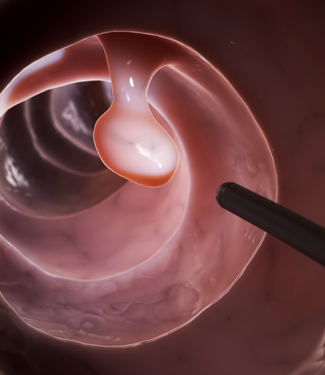Benefits of Colon Cancer Screening Decrease After Age 75
Colonoscopy screening is modestly effective for preventing colorectal cancer in patients aged 70 to 74, but the benefits may begin to diminish after that.
Image © Sebastian Kaulitzki / Shutterstock.com

Colonoscopy screening is modestly effective for preventing colorectal cancer in patients aged 70 to 74, but the benefits may begin to diminish after that, according to a study published in Annals of Internal Medicine. The risk of adverse events from the procedure was low but was greater in older individuals, according to the study.
Xabier Garcia-Albéniz, MD, PhD, of the department of epidemiology at the Harvard T.H. Chan School of Public Health in Boston, and colleagues conducted a prospective observational study of 1,355,692 Medicare beneficiaries between the ages of 70 and 79, all of whom had average colorectal cancer risk. The individuals studied had no prior diagnostic or surveillance colonoscopies in the previous 5 years.
Among Medicare beneficiaries between the ages of 70 and 74, the 8-year risk of a colorectal cancer diagnosis was 2.19% among those who received recommended colonoscopy screening compared with 2.62% among those who were not screened.
Among individuals between the ages of 75 and 79, the 8-year risk of a colorectal cancer diagnosis was 2.84% in those who received screening compared with 2.97% in those who were not screened.
Despite the widespread use of colonoscopy screening for colorectal cancer, there have not been any randomized trials of screening colonoscopies completed in the United States. There are currently three ongoing randomized trials, but these do not include individuals age 75 or older and will not be completed until at least the mid 2020s.
Current recommendations for colorectal cancer screening from the US Preventive Services Task Force (USPSTF) are for routine screening for men and women between the ages of 50 and 75 using any method, including colonoscopy. Other guidelines also recommend routine screening via colonoscopy, but have no upper age limit.
Compared with the no-screening group, the excess 30-day risk for any adverse event requiring hospitalization or an emergency department visit in the colonoscopy group was 5.6 per 1,000 individuals aged 70- to 74-year-old, and 10.3 per 1,000 individuals aged 75- to 79-year-old. Adverse events included gastrointestinal bleeding, perforations, and cardiovascular events.
“Our findings are consistent with the USPSTF recommendations for routine screening through age 75, followed by individualized decisions afterward,” wrote the study authors, and “may help patients, physicians, and policymakers make informed decisions about colorectal cancer screening.”